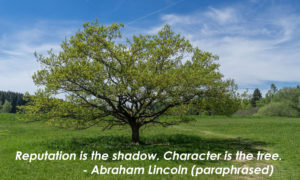Character is the most important ingredient of leadership. I often use the analogy of a structure in describing leadership where character is the foundation. Without a strong foundation of character our leadership can be weak. We often describe leadership as the combination of character and competency. Without strong, positive character our competency can seem like a rudderless boat adrift.

While character is a frequent focus of the discussion about leadership, there is no consensus on exactly how we should define it. Some definitions of character are quite broad while others are more narrow. All of the definitions refer to the inner values and behaviors that guide the way we think and operate. John Wooden said “The true test of a man’s character is what he does when no one is watching.” Character is sometimes described as the sum of virtues, values and traits.
Here are some dictionary definitions of character:
- the way someone thinks, feels, and behaves – from Merriam-Webster’s Dictionary
- the mental and moral qualities distinctive to an individual – from the Oxford Dictionary
- the particular combination of things about a person or place, esp. things you cannot see, that make that person or place different from others – from the Cambridge Dictionary
- the complex of mental and ethical traits marking a person – from Webster’s English Dictionary
The broader definitions of character often fold together character traits and emotional intelligence behaviors. Daniel Goleman’s writings on EQ often do so. Drs. Henry Cloud and John Townsend define character as “that set of capacities the leader needs to meet the demands of reality. A person of character is one who connects well; is clear in her responsibilities; can handle problems and negative realities; and understands her role and mission.” A similar definition of character is “the stable and distinctive qualities built into an individual’s life which determine his or her response regardless of circumstances.”
Character is the guiding light for how we engage with those around us, with whom we choose to interact, the quality of our relationships, the way that we make decisions, the priorities that we set, what we value, the tradeoffs we are willing to make, etc. Character affects everything we do and say. Our character determines whether those around us accept our leadership or influence. Our character is the basis of our leadership.
How would you describe character?
How would you describe your own character?

Add your comment